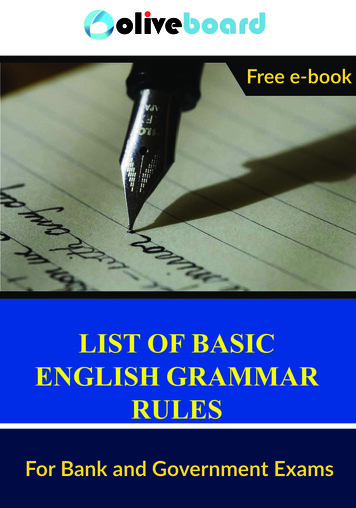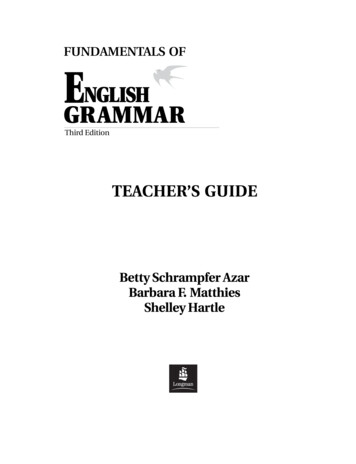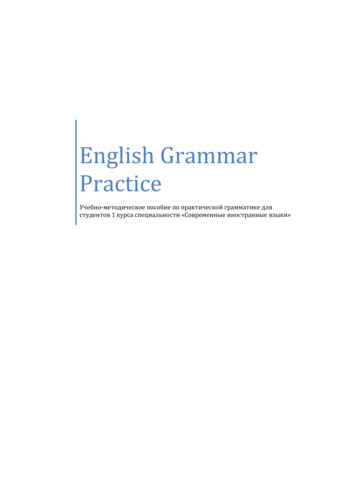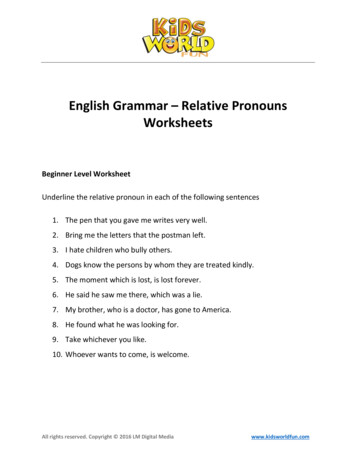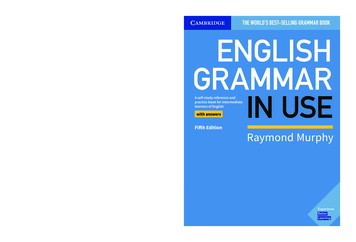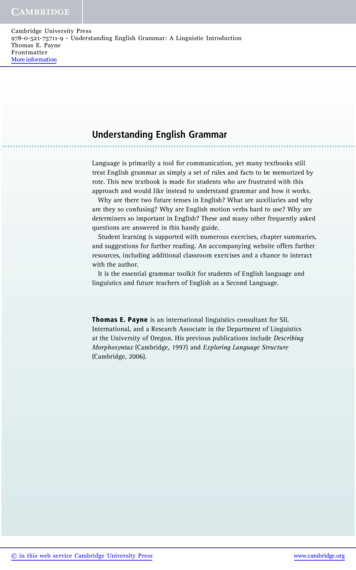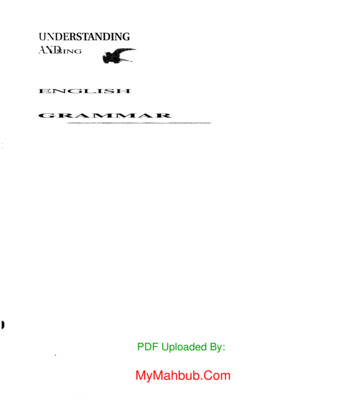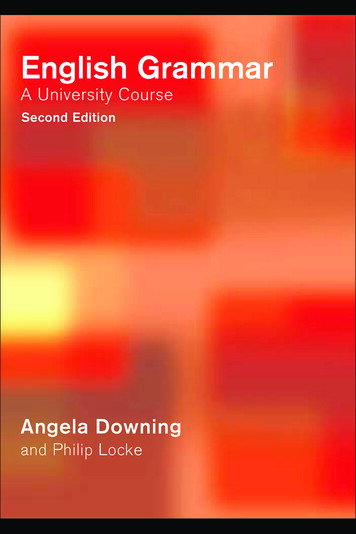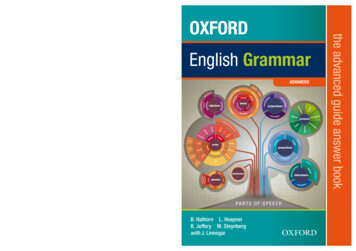
Transcription
English GrammarEnglish Grammarereflexiv/CTTRAA BSRULAcompleT I MEtiveprepositionscomcontent wordsVEMDEFestivINIadeterminersq u a n fi e r stiTEINDEFINITEti m traRdegreeindefinitexnsITIVUS U P E R L AT I V EC O M PA R AT I V EPOS ITI VEmoN NEINFINCAPR PEROG FERE ture wordsplaposCOUNTABLEnginatiord/ UNcollectivSAL9780190402426 OEG the advanced guide 8-12 AB cov.indd 1SOUTHERN AFRICALEwww.oxford.co.za780190 402426URI S B N 978 0 19 040242 69TRativeinterrogpronounsPA R T S O F S P E E C CEEXERCISESCAPSc o r r e ti v elaGERUNDSPARTICFanIncludesPLa u x ili a r yUUTityabilobAvailable for use with this book.RVEverbsREIVEDEITISSREco m m NTRABJUCOeco m p osifyclas ingadjectivesESSUHow English teachers will benefit from this guide This guide will assist the English teacher in consolidating and expandingtheir knowledge and application of language structures and conventions. An answer booklet, which includes all the answers to the exercises, isavailable online as a reference for support and extension exercises:www.oxford.co.za/9780190445454.CCONERE TABNTERPEEnglish teacher,Rondebosch Boys’ High SchoolUPTLAIVEIM“It’s a fantastic resourcefor English teachersand learners alike.”the advanced guideHow users will benefit from this guide Key language concepts are explained in a logical order, which ensuresthe progressive acquisition of knowledge. Examples of common mistakes, and how to correct them, help you toavoid frequently made language errors. Practice exercises allow you to test your own understanding and toconsolidate your grammar knowledge. A resource section with language tables may be used for referenceand self-study.SI N Oxford English Grammar: the advanced guide is a grammar reference andpractice book for the proficient English student. It offers comprehensive,advanced explanations of language concepts with annotated examples;examples of common grammar mistakes and how to correct them; andpractice exercises that help to consolidate understanding. Oxford EnglishGrammar: the advanced guide may be used in conjunction with any Englishlanguage course. This practical guide is intended for reference, self-studyand consolidation practice.ADVANCEDitaqual tiveB. Hathorn, L. Hoepner, B. Jeffery,M. Steynberg with J. LinnegarsetenADVANCEDRC O M PA AT I V EDEGREESOXFORD SECONDARY ATLASFOR SOUTH AFRICAVEOXFORD PRACTICAL TEACHINGENGLISH LITERATURE: HOW TOTEACH GRADES 8-12ITIOXFORD ENGLISH GRAMMAR:THE ESSENTIAL GUIDEOXFORDEnglish GrammarALSO AVAILABLEOXFORDthe advanced guide answer bookthe advanced guideanswer bookPOSEnglish GrammarexOXFORDB. Hathorn L. HoepnerB. Jeffery M. Steynbergwith J. Linnegar2015/09/15 10:50 AM
Oxford University Press is a department of the University of Oxford.It furthers the University’s objective of excellence in research, scholarship,and education by publishing worldwide. Oxford is a registered trade mark ofOxford University Press in the UK and in certain other countries.Published in South Africa byOxford University Press Southern Africa (Pty) LimitedVasco Boulevard, Goodwood, N1 City, P O Box 12119, Cape Town,South Africa Oxford University Press Southern Africa (Pty) Ltd 2015The moral rights of the author have been asserted.First published 2015All rights reserved. No part of this publication may be reproduced, stored ina retrieval system, or transmitted, in any form or by any means, without theprior permission in writing of Oxford University Press Southern Africa (Pty) Ltd,or as expressly permitted by law, by licence, or under terms agreedwith the appropriate reprographic rights organisation. Enquiries concerningreproduction outside the scope of the above should be sent to the Rights Department,Oxford University Press Southern Africa (Pty) Ltd, at the above address.You must not circulate this work in any other formand you must impose this same condition on any acquirer.Oxford English Grammar: the advanced guide answer bookISBN 978 0 19 044545 4First impression 2015Typeset in Times New Roman 12pt on 15ptAcknowledgementsCommissioning editor: Pete van der WoudeManaging editor: Sarah MiddletonEditor: Sarah MiddletonProofreader: Kathleen SuttonDesigner: Sarah MiddletonCover designer: Judith CrossCover artist: Samantha RowlesThe authors and publisher gratefully acknowledge permission to reproduce copyright materialin this book. Every effort has been made to trace copyright holders, but if any copyrightinfringements have been made, the publisher would be grateful for information that would enableany omissions or errors to be corrected in subsequent impressions.A4T Schools eng imprint page.indd 12014/06/12 10:59 AM
IntroductionOxford English Grammar: the advanced guide is a grammar reference and practice bookfor the proficient English student. It offers comprehensive, advanced explanations oflanguage concepts with annotated examples; examples of common grammar mistakes andhow to correct them; and practice exercises that help to consolidate understanding. Thispractical guide is intended for reference, self-study and consolidation practice and may beused in conjunction with any English language course.This answer book includes all the answers for the practice activities in Oxford EnglishGrammar: the advanced guide. This allows you to assess your progress through yourEnglish language studies. If you are a teacher, the answer book is a tool that will allow youto assess, consolidate and expand your learners’ knowledge and use of English languagestructures and conventions.How to use this answer bookThe answers are grouped according to the chapters, units and page numbers of OxfordEnglish Grammar: the advanced guide. Finding the answers you are looking for is asimple task if you follow the chapter headings, unit headings and page references in thisanswer book. Use the search function (ctrl f) in this PDF to find specific page referencesquickly and easily.This answer book may be used in conjunction with the Oxford South African ConciseDictionary, Oxford South African Pocket Dictionary, the Oxford School Thesaurus orother reputable reference works.
ContentsChapter 1: Parts of speechUnit 1: NounsUnit 2: PronounsUnit 3: AdjectivesUnit 4: DeterminersUnit 5: VerbsUnit 6: AdverbsUnit 7: PrepositionsUnit 8: ConjunctionsUnit 9: Interjections55911131422242626Chapter 2: SentencesUnit 1: Sentence structureUnit 2: Types of sentenceUnit 3: PhrasesUnit 4: ClausesUnit 5: Sentence levelUnit 6: ConcordUnit 7: Active voice and passive voiceUnit 8: Direct and indirect speech272729303134353738Chapter 3: Punctuation, spelling and dictionary workUnit 1: PunctuationUnit 2: CapitalisationUnit 3: SpellingUnit 4: Abbreviations4040444446Chapter 4: Making meaningUnit 1: DerivativesUnit 2: VocabularyUnit 3: Figures of speechUnit 4: Sound devicesUnit 5: Critical language awarenessUnit 6: Visual literacy48484953545557
Chapter 1: Parts of speechUnit 1: NounsPage 91. Write the sentences, using capital letters for the proper nouns.a) Lungisa deposited money at the branch of Standard Bank in Victoria Street in EastLondon.b) The car manufacturer, Henry Ford, was a very different man from his father, HenryFord Sr who supported Hitler and the Nazis.c) I found a great deal of information on slavery on Wikipedia and in R. C. Shell’smagnificent book, Children of Bondage.2. Complete the sentences choosing the correct form of the verb and pronoun inbrackets (the form that agrees with the collective noun).a)b)c)d)e)f)g)h)The jury has reached its unanimous verdict.The committee was on time with taking its decision on the amendment.The fleet of ships are not in a tight formation.The team are not combining well.The staff are arguing about whether they should expel the learner or not.The panel of speakers have not agreed on a single item discussed.The audience is cheering Beyoncé onto the stage.Bafana Bafana was in excellent form in the World Cup qualifiers.3. Write the sentences, using suffixes to form abstract nouns from the words inbrackets.a)b)c)d)e)f)g)h)i)Surviving the cold Atlantic for a week said much about his powers of endurance.Her alienation was a direct consequence of her egotism.Their concealment of the truth led to their being jailed.The foolhardiness of attempting to climb Mount Everest in a storm is obvious.The sheer ignobility of his excuse for deserting his family left many speechless.On the day the verdict was delivered, the accused’s edginess was apparent.Soldiers who have survived the horrors of war together speak of their brotherhood.My patriotism can be defined as a critical love of my country.Her membership of the Bar was a source of great pride to her parents.5
Page 111. Change the underlined nouns from singular to plural in the following passage.Their lives were being made unbearable by black swarms of mosquitoes from the grove ofmangoes/mangos – not to mention the pack of gaunt wolves and the gang of elves thatattacked through the roofs of the derelict buildings. The pack brought with it terriblestrains of bacteria that came from several inland zoos. Still, throughout these crises, thesurvivors clung to hope.2. Identify the uncountable nouns in the following paragraph.The principal was a woman given to deep meditation followed by bouts of intense activity.She looked through the glass of her office window past the slate of the roof atop thebuilding at the emptiness of the autumn sky. It was late in the day and silence hung heavyover the township school. A quiet satisfaction took possession of her. With Mr Brotskygone, her reign could begin.3. Write the nouns from the list under the correct headings.Abstract conceptsMasses of substancesMasses of substancesmade up of parts toonumerous to floursaltPage 131. Divide the list of complex nouns into their component words. Indicate the partof speech of each word.a)b)c)d)e)f)g)h)i)j)grand (adjective) mother (noun)data (noun) base (noun)fore (adjective) front (noun)after (preposition) thought (noun)down (adverb) town (noun)sell (verb) out (adverb)look (verb) alike (adverb)swear (verb) word (noun)under (preposition) world (noun)flash (verb) back (adverb)6
2. Briefly describe each pair of terms that follow to show the difference betweenthem.a hot-head a quick-tempered person / a hot head feverisha big-head a conceited person / a big head a large heada lock-up a makeshift jail / to lock up put into a prison cell or secure premisesa cover-up an attempt to conceal a mistake or a crime / to cover up wrap up orhidee) a let-down a disappointment / to let down lowera)b)c)d)3. There are compound and complex nouns in the following passage that havebeen written incorrectly. Rewrite them correctly.She was a poor driver. She often tried to reverse her taxi by putting it into first gear. Whenthe passengers roared with laughter she would furiously seek out the mischief makers inthe mirror and glare them into silence. Her father had been one of three sergeant-majors inthe family and she had inherited his voice, which she used to terrify bystanders at the taxirank in Germiston. This 60-year-old was very conservative, a real stick-in-the-mud. Shewould borrow a bakkie from the last of her three fathers-in-law and drive around townuntil she came upon any young man with long hair, whom she would hoot at and berate asa blockhead. Her one weakness was mother-of-pearl, which was easily sourced from theabundance of perlemoen shells in Germiston. This proud housewife had spectacularearrings made from it.Page 161. Form diminutives from the following words by using the suffixes in the ock2. Give the diminutives of the following animals.a)b)c)d)e)lambnestling/chickelephant calfcygneteaglet3. Indicate which of the following sentences are negatively affected by theincorrect use of augmentatives.c) South African society is divided into the mega-rich and the mega-poor.d) The latest Audi R8 accelerates at hypersonic speeds.7
4. Correct the gender mistakes in the following WE:You’ve had your new baby! What’s its name?In fact she is a baby girl.She is so beautiful. What’s her name?Nomakhaya.Look – she’s scratching herself! I suppose you want her to become aflight attendant like you? Or become a principal like your brother?NOMALANGA: I think it’s a little early to decide. By the way, is it true that your sister,Thuli, wants to become a writer/author?Page 181. Explain the difference in meaning between these pairs of sentences.a) I like to race cars. I like to participate in car races.I like racing cars. I like cars that are used to race.b) He forgot to tell me the news about the fire. He forgot to tell me about the fire.He forgot telling me the news about the fire. He forgot that he had told me about thefire.c) She remembers to go to church. She remembers that she has to go to church.She remembers going to church. She remembers that at some point she attendedchurch.d) The old man remembers to pay his tax every year. The old man always pays his taxevery year.The old man remembers paying his tax every year. The old man remembers that heused to pay his tax every year.e) The policeman stopped to ask what was wrong. The policeman stopped while on hisway and asked what the problem was.The policeman stopped asking what was wrong. The policeman used to ask what theproblem was but has stopped doing that.2. Choose the correct word in brackets to complete the sentences.a)b)c)d)e)f)g)h)I do not like your leaving tomorrow.I welcome his using me as a reference.There is no point in Be
advanced explanations of language concepts with annotated examples; examples of common grammar mistakes and how to correct them; and practice exercises that help to consolidate understanding. Oxford English Grammar: the advanced guide may be used in conjunction with any English language course. This practical guide is intended for reference, self-study and consolidation practice. How users .File Size: 2MBPage Count: 59People also search forenglish grammar 101 pdfenglish smart 3 answersEnglish Grammar the advanced guide pdfenglish words with meaning pdfoxford english grammar book pdfOxford English Grammar Advanced pdf
